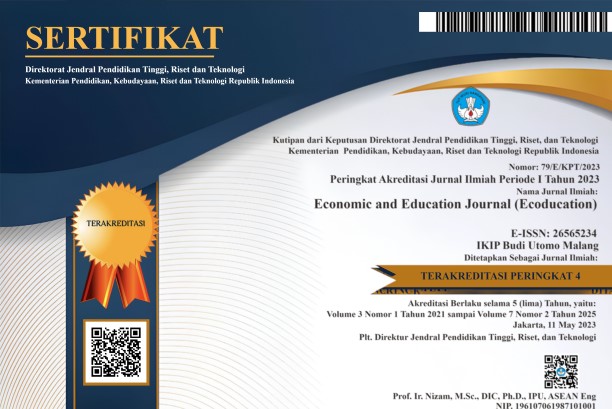Pengaruh Financial Knowledge, Financial Attitude, Locus Of Control dan Income Terhadap Financial Management Behavior (Studi Kasus pada ASN di Kabupaten Magetan)
The Influence of Financial Knowledge, Financial Attitude, Locus of Control and Income on Financial Management Behavior (Case Study on ASN in Magetan Regency)
Abstract
Tujuan dari penelitian ini adalah untuk menyelidiki bagaimana pengetahuan keuangan, sikap keuangan, locus of control, dan pendapatan berdampak pada tindakan pengelolaan keuangan pada Aparatur Sipil Negara (ASN) di Kabupaten Magetan. Metode purposive sampling digunakan untuk meneliti ASN Non Guru dengan pendapatan dari gaji dan TPP. Kuesioner dikirim ke 317 orang secara online dan offline. Penelitian ini menggunakan pendekatan kuantitatif yang menggunakan Structural Equation Modeling (SEM) pada program AMOS. Hasilnya menunjukkan bahwa pengetahuan tentang keuangan, sikap keuangan, locus of control, dan pendapatan memengaruhi tindakan pengelolaan keuangan. Sebagian besar responden berusia di atas 30 tahun, memiliki pendapatan tetap antara Rp.4.500.000 dan Rp.6.900.000, dan sudah menikah, yang menunjukkan pola pikir yang baik tentang membuat keputusan keuangan. Dengan pengetahuan keuangan, responden selektif dalam pengeluaran dan membandingkan produk lembaga keuangan dan investasi yang sesuai dengan pendapatan mereka. Dengan pendapatan tetap yang tidak terlalu besar, responden cenderung lebih bertanggung jawab dan mengutamakan kebutuhan daripada keinginan dalam pengeluaran mereka.
References
Baptista, S. M. J. (2021). The Influence of Financial Attitude, Financial Literacy, and Locus of Control on Financial Management Behavior (Study Case Working-Age of Semarang). International Journal of Social Science and Business, 5(1), 93–98. https://doi.org/10.23887/ijssb.v5i1.31407
Chandra, W., & Pamungkas, A. S. (2023). The Influence of Attitude Toward Money, Locus of Control, Financial Self-Efficacy and Self-Control on Financial Management Behavior. International Journal of Application on Economics and Business, 1(1), 578–587. https://doi.org/10.24912/ijaeb.11.578-587
Coskun, A., & Dalziel, N. (2020). Research in Business & Social Science Mediation effect of financial attitude on financial knowledge and financial behavior : The case of university students. International Journal of Research In Business and Social Science, 9(2), 1–8.
Coskun, A., Sahin, M. A., & Zengin, A. (2019). Financial Literacy in Turkey : A Field Study to Touch Base with the OECD. International Journal of Research in Business and Social Science (2147-4478), 8(3), 01–16.
Dinda Pramedi, A., & Asandimitra, N. (2021). Pengaruh Financial Literacy, Financial Knowledge, Financial Attitude, Income Dan Financial Self Efficacy Terhadap Financial Management Behavior Entrepreneur Lulusan Perguruan Tinggi Di Surabaya. Jurnal Ilmu Manajemen, 9(2), 572–586.
Goyal, K., Kumar, S., Xiao, J. J., & Colombage, S. (2022). The psychological antecedents of personal financial management behavior: a meta-analysis. International Journal of Bank Marketing, 40(7), 1413–1451. https://doi.org/10.1108/IJBM-02-2022-0088
Grable, J. E., Archuleta, K. L., Ford, M. R., Kruger, M., Gale, J., & Goetz, J. (2020). The Moderating Effect of Generalized Anxiety and Financial Knowledge on Financial Management Behavior. Contemporary Family Therapy, 42(1), 15–24. https://doi.org/10.1007/s10591-019-09520-x
Herdjiono, I., & Damanik, L. A. (2016). Pengaruh Financial Attitude,Financial Knowledge, Parental Income Terhadap Financial Management Behavior. Jurnal Manajemen Teori Dan Terapan| Journal of Theory and Applied Management, 9(3), 226–241. https://doi.org/10.20473/jmtt.v9i3.3077
Indriaswari, I., Ketut, G., Ulupui, A., & Warokka, A. (2022). The International Journal of Social Sciences World Financial Knowledge, Financial Attitude, and Locus of Control: Reviewing Their Influence on Financial Management Behavior Using Financial Literacy as Moderation Variable. The International Journal of Social Sciences World, 4(2), 431–443.
Ismail, S., Faique, F. A., Bakri, M. H., & Zain, Z. M. (2017). The Relationship between Financial Attitude and Financial Goal Towards Financial Behaviour: An Empirical Investigation. The Social Sciences, 12(1), 43–47.
Kayode, O. S., Sibanda, M., & Olarewaju, O. M. (2022). Analyzing the determinants of financial management behavior of administrators in Nigerian state-owned enterprises. Investment Management and Financial Innovations, 19(3), 278–290. https://doi.org/10.21511/imfi.19(3).2022.23
Laga, A., Hizazi, A., & Yuliusman. (2023). The Effect of Financial Literacy, Financial Attitude, Locus of Control, and Lifestyle on Financial Management Behavior (Case Study on Undergraduate Accounting Study Program Students Faculty of Economics and Business Jambi University). Indonesian Journal of Economic & Management Sciences, 1(4), 459–480. https://doi.org/10.55927/ijems.v1i4.4977
Mardiana, M., & Widoatmojo, S. (2023). Factors Affecting Financial Management Behavior Among Universitas Tarumanagara’s Students. International Journal of Application on Economics and Business, 1(1), 354–362. https://doi.org/10.24912/ijaeb.v1i1.354-362
Moko, W., Sudiro, A., & Kurniasari, I. (2022). The effect of financial knowledge, financial attitude, and personality on financial management behavior. International Journal of Research in Business and Social Science (2147- 4478), 11(9), 184–192. https://doi.org/10.20525/ijrbs.v11i9.2210
Nano, D. (2015). The Interrelationship between Financial Attitude, Financial Behavior and Financial Knowledge. International Journal of Business & Technology, 4(1). https://doi.org/10.33107/ijbte.2015.4.1.09
Perry, V. G., & Morris, M. D. (2005). Who is in control? the role of self-perception, knowledge, and income in explaining consumer financial behavior. Journal of Consumer Affairs, 39(2), 299–313. https://doi.org/10.1111/j.1745-6606.2005.00016.x
Prihartono, M. R. D., & Asandimitra, N. (2018). Analysis Factors Influencing Financial Management Behaviour. International Journal of Academic Research in Business and Social Sciences, 8(8), 308–326. https://doi.org/10.6007/ijarbss/v8-i8/4471
Ratnawati, T., Nugroho, M., Soare, J., Gusmao, C., Riyani, D., Kuay Rumaratu, F. R., Borges Loe, D., & Baptista Barbosa, F. N. (2023). Analysis of Household Financial Behavior in Indonesia and Timor Leste. International Journal of Social Science Humanity & Management Research, 2(12), 1169–1181. https://doi.org/10.58806/ijsshmr.2023.v2i12n05
Rizkiawati Laili, & Asandimitra Nadia. (2018). Pengaruh Demografi, Financial Knowledge, Financial Attitude, Locus Of Control, Dan Financialk Self Eficacy Terhadap Financial Management Behavior Masyarakat Surabaya. Jurnal Ilmu Manajemen, 6(3), 93–107.
















